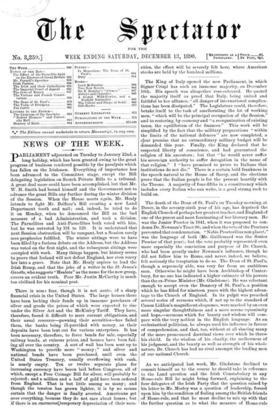The death of the Dean of St. Paul's on Tuesday
morning, at Dover, in the seventy-sixth year of his age, has deprived the English Church of perhaps her greatest teacher, and England of one of the purest and most fascinating of her literary men. He was the Junior Proctor in 1841, when it was proposed to con- demn Dr. Newman's Tract 90; and when the veto of the Proctors prevented that condemnation. "Noble Proctoribus non placet," was the language of both (Mr. Guillemard was the Senior Proctor of that year); but the veto probably represented even more especially the conviction and purpose of Dr. Church, who had been greatly under Newman's influence, though he did not follow him to Rome, and never, indeed, we believe, felt seriously the temptation to do so. The Dean of St. Paul's, though a supremely able, was very far from an ambitious man. Otherwise he might have been Archbishop of Canter- bury, for no one has indicated a higher estimate of his powers than the ex-Prime Minister (Mr. Gladstone). He was reluctant enough to accept even the Deanery of St. Paul's, a position which he has filled for nineteen years with the highest advan- tage to the Church of England. In its pulpit was preached several series of sermons which, if not up to the standard of Canon Liddon's magnificent eloquence, were marked by an even more singular thoughtfulness and a more serene equanimity and hope,—sermons which for beauty and wisdom will com- pare with the very noblest in the English language. As an ecclesiastical politician, he always used his influence in favour of comprehension, and that, too, without at all sharing many of the more pronounced doctrinal views over which he threw his shield. In the wisdom of his charity, the mellowness of his judgment, and the beauty as well as strength of his whole nature, Dr. Church has had no rival amongst the leading men of our national Church.










































